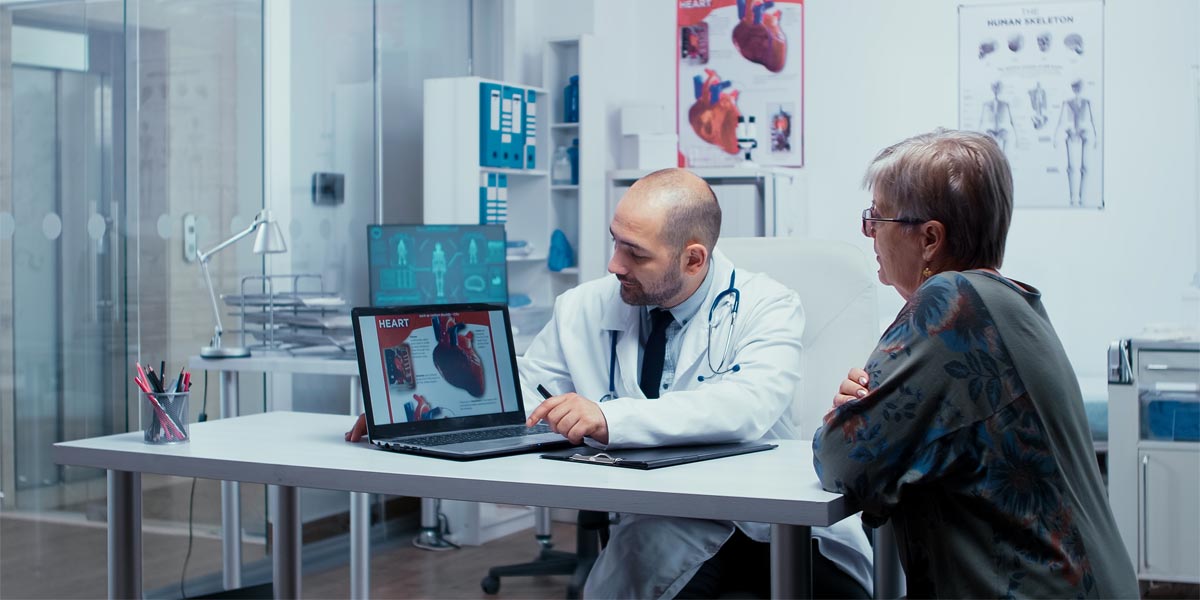Dilated cardiomyopathy (DCM) is the most common type of heart disease in adults younger than 50. Let’s look at some facts about dilated cardiomyopathy, such as its symptoms, causes, prevention, and how remote patient monitoring can help in disease management.
What is Dilated Cardiomyopathy?
In dilated cardiomyopathy, the heart chambers enlarge and lose their ability to contract (DCM). It usually begins in the left ventricle. The disease may spread to the right ventricle and atria as it progresses. The heart chamber becomes weak and does not contract adequately as it spreads. The heart will no longer pump as much blood forward. As a result, fluid builds up in the lungs and throughout the body. This is referred to as cardiac failure.
How does remote patient monitoring help?
Remote patient monitoring or RPM is a type of telehealth that allows patients to stay connected with their healthcare providers in real-time. Patients take measurements at home using medical devices such as blood pressure monitors, weight scales, pulse oximeters, wearable devices, etc. Their readings are automatically sent to their healthcare providers, allowing them to check their health conditions promptly and provide medical intervention when needed.
- Analyze the health-related quality of life in patients with dilated cardiomyopathy.
- Promote positive self-care with compliance to treatment.
- Provide clear information about the medication effects, a belief that the illness has serious consequences, and the impact of medication use on lifestyle.
- Provide an early, pathophysiological-based diagnosis and better risk stratification.
- Enables personalized therapy based on aetiological assessment of disease.
What are the symptoms of dilated cardiomyopathy?
- Shortness of breath
- Shortness of breath that wakes you up in the middle of the night
- Fatigue
- Ability to be active is hampered
- Leg swelling
- Fainting
- Lightheadedness
- Cough
- Irregular heartbeats
What causes dilated cardiomyopathy?
- Infections such as HIV
- Autoimmune conditions such as polymyositis
- Abuse of alcohol, cocaine, heavy metal exposure, and certain chemotherapeutic medicines
- Thyroid illnesses
- Diabetes
- Blood pressure that is too high
- Irregular heartbeats
- Coronary artery disease
- Valve abnormalities in the heart
- Problems with nutrition or electrolytes
- Expectant motherhood
- Muscular dystrophies
How to prevent this condition?
- Exercise.
- Consult your doctor to determine which activities are safe and valuable for you.
- Stop smoking.
- Don’t overindulge in illegal substances or excessive alcohol consumption.
- Cocaine and other illegal narcotics put pressure on the heart. Before you consume alcohol, seek medical counsel.
- Maintain a healthy body mass index (BMI).
- Your heart has to work harder when you’re overweight. If you’re overweight or obese, you should lose weight.
- Eat a diet that is good for your heart.
- Limiting salt, added sugar, cholesterol, saturated fats, and trans fats, as well as consuming whole grains and a variety of fruits and vegetables, are all part of this strategy.
What are the complications?
- Heart failure due to congestive heart failure.
- Cerebrovascular Accident.
- Valvular heart disease.
- Arrhythmias.
- Sudden cardiac death.
- Thromboembolism.
How is dilated cardiomyopathy treated?
- Medications
- To boost heart performance
- To alleviate symptoms and avoid consequences
- Lifestyle modification
- Low-sodium diet
- Non-competitive aerobic exercise
- Implantable Devices
- Cardiac Resynchronization Therapy
- Implantable Cardioverter Defibrillators
- Heart transplant
Takeaway
Dilated cardiomyopathy, often known as “enlarged heart,” is a heart muscle disorder that occurs when your heart muscle enlarges or dilates and becomes too weak to pump blood properly, leading to contractile failure over time. You can get it from your parents or coronary artery disease. Cardiomyopathy is the most frequent type and can lead to severe morbidity and mortality.
Remote patient monitoring can play a vital role in preventing or managing this condition by allowing patients and doctors to stay connected wherever they use home medical devices and a cloud-based mobile application.
Related article: Hypertrophic Cardiomyopathy and How Remote Patient Monitoring Helps Optimize Heart Health
If you are looking for a way to stay connected with your healthcare provider, contact DrKumo for more information.








